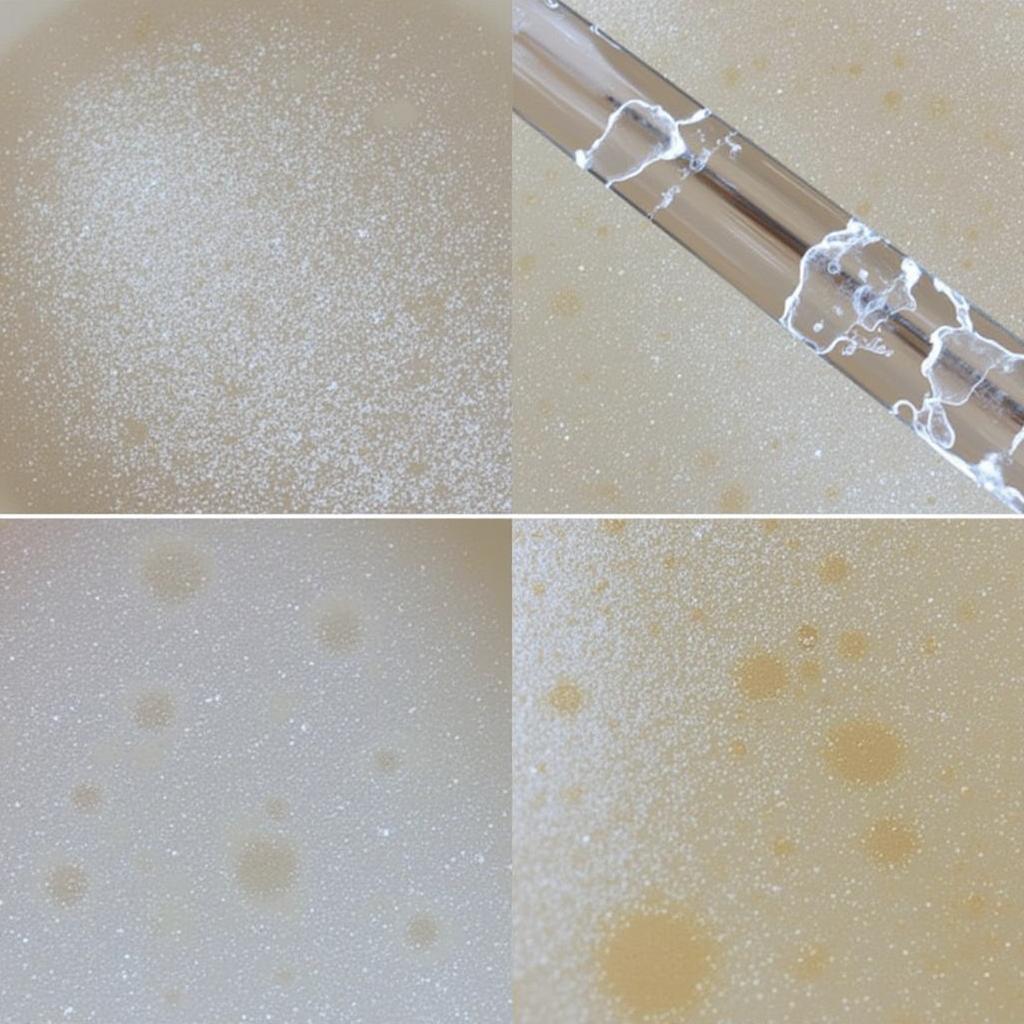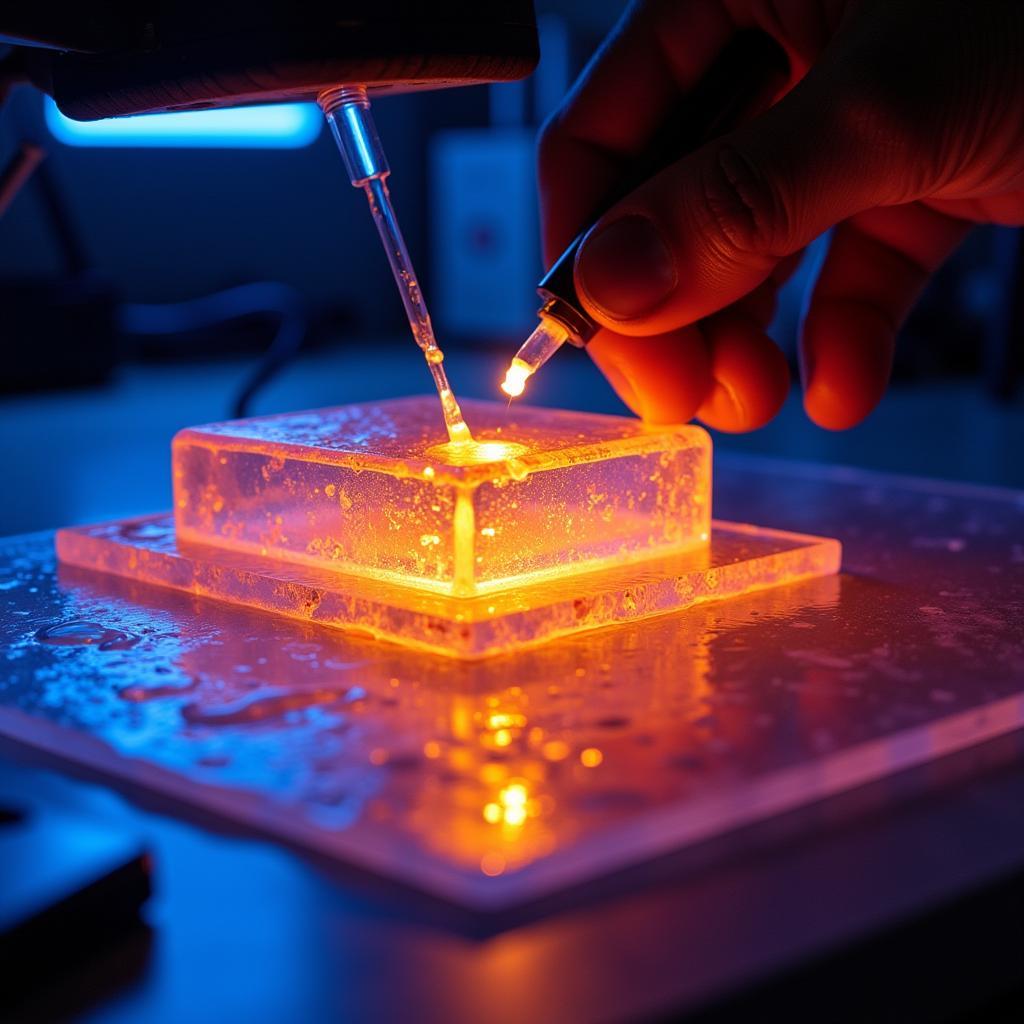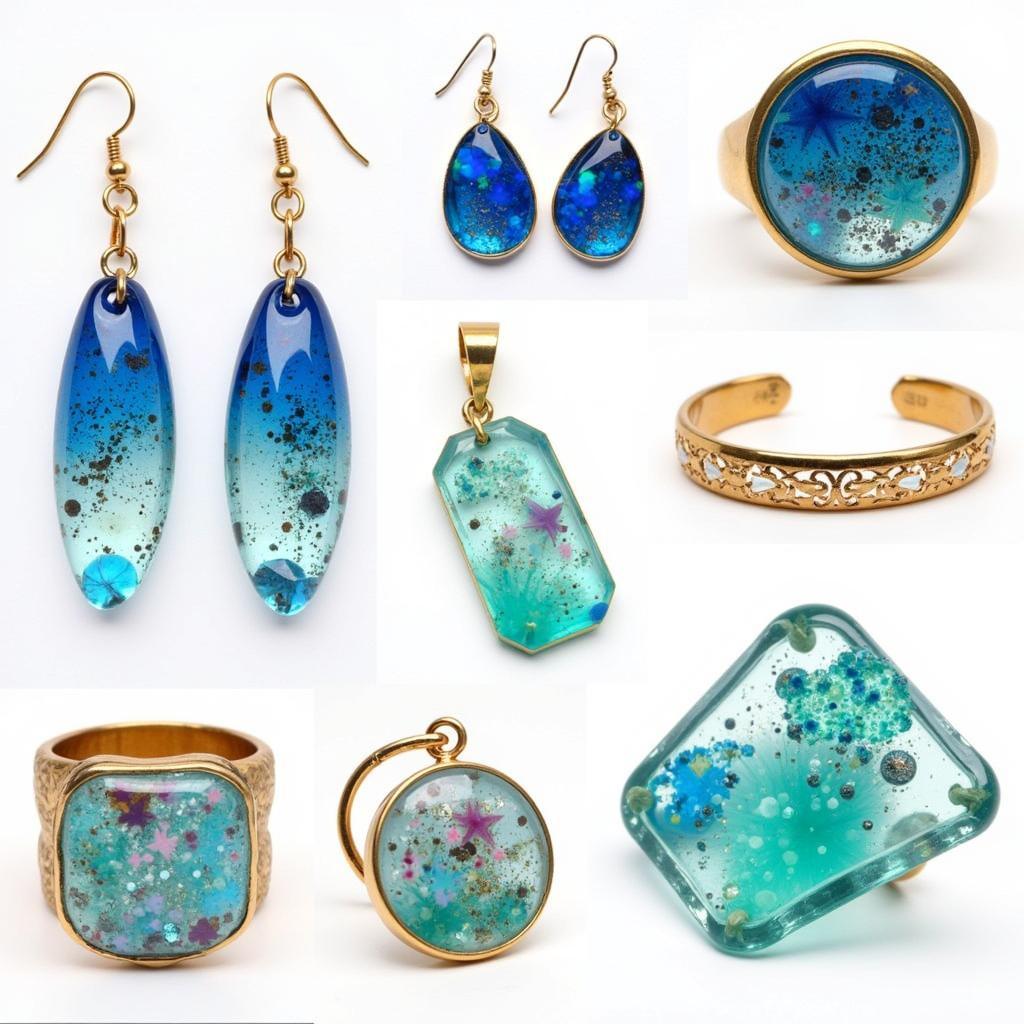UV resin is a versatile crafting medium, but the question of “Food Safe Uv Resin” is crucial for anyone considering using it for projects involving food contact. Let’s explore the world of UV resin and its food safety aspects. is uv resin food safe
Understanding UV Resin and Food Safety
When we talk about food safe uv resin, we’re delving into the chemical makeup of the resin and how it interacts with food. Standard UV resin typically contains uncured monomers and oligomers, which can leach into food if not fully cured or if the cured surface is compromised. This can pose health risks. Therefore, labeling a UV resin as truly “food safe” requires rigorous testing and certification.
Is there such a thing as food-safe UV resin? While some manufacturers claim their resins are food-safe after curing, it’s vital to understand what that means. Complete curing is essential, and even then, direct contact with food should be minimized.
 Cured UV resin samples under magnification
Cured UV resin samples under magnification
Navigating the “Food Safe” Label for UV Resin
The term “food safe” can be misleading. Many resins are labeled “food safe” after curing, implying they’re inert and won’t leach chemicals. However, this often only applies to indirect contact, such as decorative items that don’t directly touch food. For direct contact, such as coating the inside of a bowl, extra precautions are needed, and even then, it’s generally not recommended.
What about FDA approval? True FDA compliance for direct food contact requires extensive testing and certification, which most crafting resins don’t undergo. Therefore, it’s best to err on the side of caution.
Safe Practices When Using UV Resin
Even when using a resin marketed as “food safe after curing,” follow these precautions:
- Cure completely: Ensure your resin is fully cured according to the manufacturer’s instructions. Insufficient curing increases the risk of leaching.
- Minimize contact: Avoid using UV resin for items that will have prolonged or direct contact with food, especially hot or acidic foods.
- Surface sealing: Consider applying a food-safe sealant over the cured resin to create an additional barrier. However, this doesn’t guarantee complete food safety.
 UV resin curing under a UV lamp
UV resin curing under a UV lamp
Alternatives for Food Contact Applications
If you need a truly food-safe coating for items that will come into direct contact with food, consider these alternatives:
- Food-grade epoxy resins: These are specifically formulated for food contact and meet stringent safety standards.
- Food-grade silicone: Silicone is another excellent option for molds and coatings that will be used with food.
Dr. Emily Carter, a materials scientist specializing in polymer chemistry, advises, “While some UV resins might seem harmless after curing, it’s crucial to remember that their primary purpose isn’t food contact. Opting for dedicated food-safe materials is always the safest approach.”
Is UV Resin Food Safe for Jewelry?
While UV resin jewelry isn’t typically meant for consumption, it’s essential to consider skin sensitivities. Fully cured UV resin is generally considered safe for skin contact, but individuals with allergies should exercise caution.
Professor John Miller, a dermatologist at the University of California, adds, “Even with cured resin, prolonged skin contact can sometimes lead to irritation in sensitive individuals. It’s always advisable to remove resin jewelry before sleeping or showering.”
 Examples of UV resin jewelry
Examples of UV resin jewelry
Conclusion: Proceed with Caution When Using Food Safe UV Resin
While the allure of using UV resin for food-related projects is understandable, it’s crucial to prioritize safety. “Food safe” labeling doesn’t always guarantee complete safety for direct food contact. Always follow best practices, minimize contact, and consider dedicated food-safe alternatives for direct food contact applications. For further information about food safe deep pour epoxy, visit food safe deep pour epoxy.
FAQs
- Can I use any UV resin for food contact? No, only resins specifically labeled and certified for food contact should be used.
- What does “food safe after curing” mean? It generally implies that the cured resin is inert and won’t leach chemicals under indirect contact conditions.
- Is FDA approval necessary for food-safe resins? Yes, for direct food contact, FDA compliance is essential.
- What are alternatives to UV resin for food contact? Food-grade epoxy resins and silicone are safer alternatives.
- Is cured UV resin safe for skin contact? Generally, yes, but individuals with allergies should exercise caution.
- Can I use UV resin to coat the inside of a coffee mug? It’s not recommended. Even “food safe” UV resin isn’t ideal for prolonged, direct contact with hot liquids.
- How can I ensure my UV resin is fully cured? Follow the manufacturer’s instructions carefully regarding curing time and intensity.
Scenarios
- Coating a coaster: Use a resin specifically labeled for food contact and ensure complete curing. Even then, direct contact with food should be minimized.
- Making a serving tray: Not recommended. Choose a food-safe alternative like wood or bamboo.
- Creating decorative items for the kitchen: Acceptable, as long as the items don’t come into direct contact with food.
Further Reading
For more information on related topics, please visit our articles on:
- Is UV Resin Food Safe?
- Food Grade Bulk Bags
- Food Safe Resin Epoxy
- Food Safe Epoxy Paint
- Food Safe Deep Pour Epoxy
Need assistance? Contact us at Phone: 02437655121, Email: minacones@gmail.com or visit our address: 3PGH+8R9, ĐT70A, thôn Trung, Bắc Từ Liêm, Hà Nội, Việt Nam. We have a 24/7 customer service team.